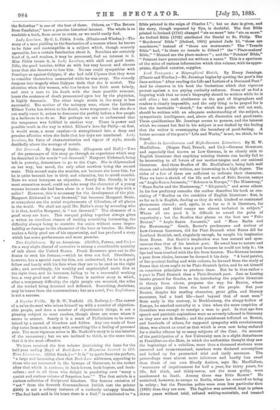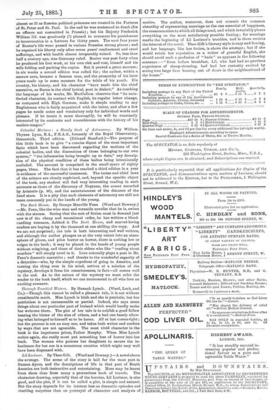Studies in Low-German and High-German Literature. By M. W. MacCallum.
(Began Paul, Trench, and Co.)—German literature, and especially that known as Low German, is so closely akin to English literature that anything relating thereto can hardly fail to be interesting to all lovers of our mother-tongue and our national literature. And these Studies of Mr. MacCallum's, being both well chosen and admirably written, are interesting in a high degree. The titles of a few of them are sufficient to indicate their character. Thus we have a sketch of the life and work of Fritz Renter, essays on "Anglo-Saxon Jocoseria," "Solomon in Europe," "The Minnesong," "Hans Sachs and the Mastersong," " Klopstock," and some others. In his few prefatory remarks the author describes his book as con- sisting of "Studies on the outskirts of English literature : first, in so far as it is English, dealing as they do with kindred or contrasted phenomena abroad ; and, again, in so far as it is literature, for the second and third essays are almost technical in subject." Where all are good it is difficult to award the palm of superiority ; but the Studies that please na the best are "Fritz Reuter," " Anglo Saxon Jocoseria," and "Hans Sachs and the Mastersong." -Grath, Reuter's predecessor and reviver of Low-German literature, did for Platt Deutsch what Barns did for Lowland Scottish, and, singularly enough, he caught his inspiration from Burns. But Grath's inspiration was less natural and spon- taneous than that of his brother plet. He owed less to nature and more to art. The Scot was a poet because he could not help it ; his lips had been touched with the fire from heaven. The German became a poet from choice, because he deemed it his duty. "A local patriot, of fine poetical feeling and wide culture, he learned from the study of Burns that there ought to be Platt-Deutsch lyrics, and he set himself on conscious principles to produce them. But he is thus rather a a poet in Platt Deutsch than a Platt-Deutsch poet. Just as Leasing breaks ground for Goethe, so be, introducing the popular literature in theory from above, prepares the way for Renter, whose stories pulse direct from the heart of the people. But poor Reuter, despite his sterling character, great gifts, and literary successes, had a hard life—hard beyond that of most men.' Both early in the century, in Mecklenburg, the sleepy-hollow of Europe, he reached maturity at a time when the mere suspicion of liberalism was enough to consign a man to gaol. In that age free speech and patriotic aspirations were as severely tabooed in Germany as they now are in Russia ; and the punishment inflicted on Renter, and hundreds of others, for supposed sympathy with revolutionary ideas, was almost as cruel as that which is even now being endured for a similar offence by so many subjects of the Czar. . On account of the participation of a few University men in a slight disturbance at Frankfort-on-the-Main, in which the authorities thought they saw the beginnings of a rebellion, more than a thousand students were arrested and cross-examined, numbers were declared accomplices and locked up for protracted trial and tardy sentence. The proceedings were almost more infamous and hardly less cruel than those of our own Bloody Assizes, says Mr. MacCallum, "sentences of imprisonment for half a year, for thirty years, for life, fell thick, and thirty-seven, not the most guilty, were condemned to death. Among these was Fritz Reuter." He contrived, however, to escape to Berlin, where he counted on being in safety ; but the Prussian police were even less particular then (1833) than they are now. The fugitive was arrested, kept in prison three years without trial, refused writing-materials, and treated
almost as ill as Russian political prisoners are treated in the Fortress of St. Peter and St. Paul. In the end he was sentenced to death (for an offence not committed in Prussia) ; but his Majesty Frederick William III. was graciously (!) pleased to commute his punishment to incarceration in a fortress for thirty years. The next four years of Renter's life were passed in various Prussian strong places ; and he regained his liberty only after seven years' confinement and cruel sufferings, and with health almost irreparably rained. So, less than half a century ago, was Germany ruled. Reuter was past forty when he produced his first work, at his own risk and cost, himself and his wife folding and packing the copies. Bat it proved a great success ; in six weeks a second edition was called for ; the author, within a narrow area, became a famous man, and the prosperity of his later years made up in some measure for the trials of his youth. His country, his history, and his character "have made him the chief narrative, as Burns is the chief lyrical, poet in dialect." As touching the language of his works, Mr. MacCallum observes that "its unin- flected character, its contact with English, its regular letter change, as compared with High German, make it simple reading to any Englishman who is fairly acquainted with the latter, and after a few pages he needs notes and vocabulary only for individual words and phrases. If he treats it more thoroughly, he will be constantly interested by its contrasts and resemblances with the history of his mother-tongue."



































 Previous page
Previous page